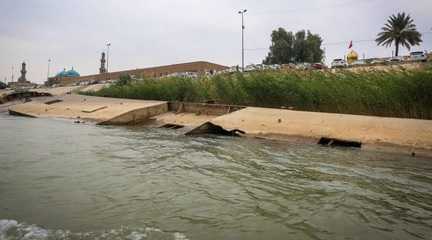
by Thomson Reuters Foundation
Every morning at sunrise, Iraqi fisherman, Ahmad Hassan Lelo, emerges from his shack on the banks of the Tigris River in the heart of Baghdad, and every morning his heart breaks at the sight before him.
The once mighty river that meandered past his home is a shadow of its former self. Its flowing waters – depleted by a devastating drought and dams, and polluted by sewage and industrial waste – have become muddy and listless.
Lelo started to learn his trade by his father's side as an 8-year-old boy but, today, his main source of income comes not from fishing but from ferrying people from one side of the river to the other in his small boat.
"This has been the worst year of my life," the 56-year-old said. "The river is dead, and our livelihoods are dead with it."
Iraq, which is experiencing its worst drought in decades, is among the top five countries most affected by climate change around
the world, and is the 39th most water-stressed country globally, according to the United Nations.
This year has been the country's driest since 1930, a government advisor said in late September, depleting the country's two main rivers – the Euphrates and the Tigris – and fuelling competition for water with neighbouring countries.
Dams, Pollution
The basin of the Tigris, the second-largest river in Western Asia after the Euphrates, is shared by four countries – Iraq, Iran, Syria and Turkiye.
There are 14 dams along its course, and irrigation and hydroelectric projects are putting pressure on the river's flows, according to the Inventory of Shared Water Resources in Western Asia, a report prepared by UN agencies.
Iraqi officials say lower river flows from upstream neighbours Iran and Turkiye – which are building dams to ease their own lack of water – are worsening home-grown problems such as leaks, ageing pipes, and illegal siphoning off of supplies.
Rising demand for water in Baghdad, a growing city of some 8 million people, is putting further strain on dwindling resources, while treatment plants are lacking, according to a 2022 report by the University of Baghdad.
"When the amount of water goes down, the pollution goes up," said Moutaz Al-Dabbas, one of the report's authors.
Pollution from untreated wastewater, including sewage and garbage dumping, poses an additional threat to fish and other wildlife in the Tigris around Baghdad, the report said.
In 2018, thousands of tonnes of freshwater carp – which form the basis of one of the country's best-known dishes – washed up dead in the Euphrates due to high levels of coliform bacteria, heavy metals, and ammonia in the water.
"We call for the purification of all this water before it is dumped into the rivers," Al-Dabbas said.
Iraq's Environment Ministry said in September it would form a committee to evaluate water pollution in the country. An official at the Ministry of Water Resources did not respond to requests for comment.
Bad for Business
At Baghdad's Al-Shawakeh fish market, stallholders – many of whom are also fishermen – are worried about the river's future, and their earnings.
Baker Ali, 48, who sells fishing supplies at his store in the middle of the market, said he recently spent eight hours out on the river without catching anything.
"All of us have been hurt," he said, lamenting a 90 per cent sales slump at his shop, compared with last year. "When the fishermen suffer, we all suffer."
Close by, freshly caught river fish flap in the makeshift pools of white polystyrene boxes, destined for the city's famous Masgouf restaurants.
Masgouf, a dish featuring grilled carp, is often the first meal visitors to the country are encouraged to try.
But, as water levels recede, many fear the fish will disappear from the country's rivers, replaced by less-prized farmed carp.
"Last year was easier, the one before that easier still," Ali said, adding that many of his relatives had already quit fishing. "There is no water, there is no fish."
READ: Iraq drought pushes 3,000 families to leave homes
Sadek, 53, who asked not to give his surname, comes from a family of fishermen, but he has not been out on the water in almost a decade.
Sitting behind a white plastic table in his fishing supplies shop, he blamed damage to the environment and government failures to tackle the issue for his decision to abandon fishing, and for his declining sales.
"We spend an entire day without selling anything," he said. "We cannot afford to live anymore.




